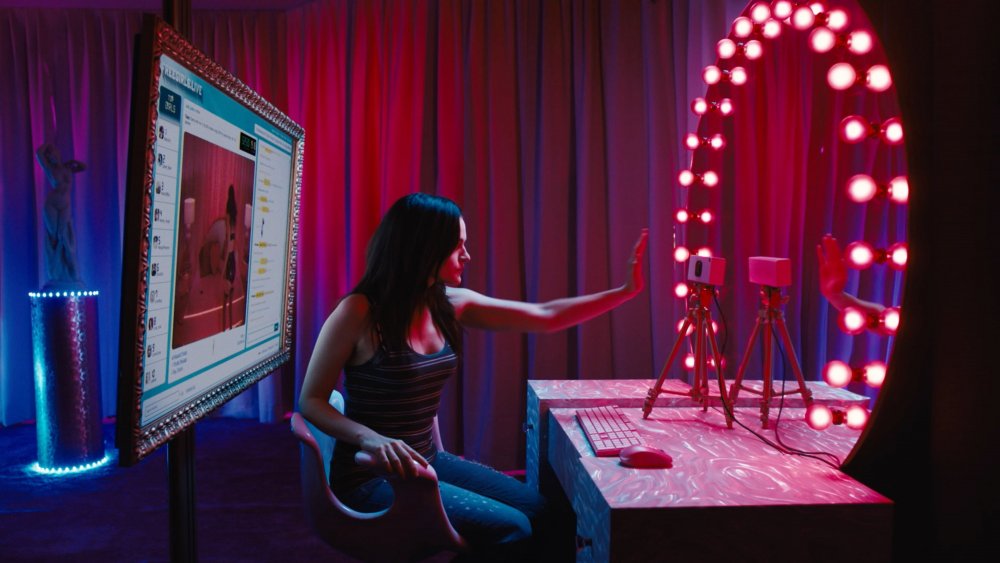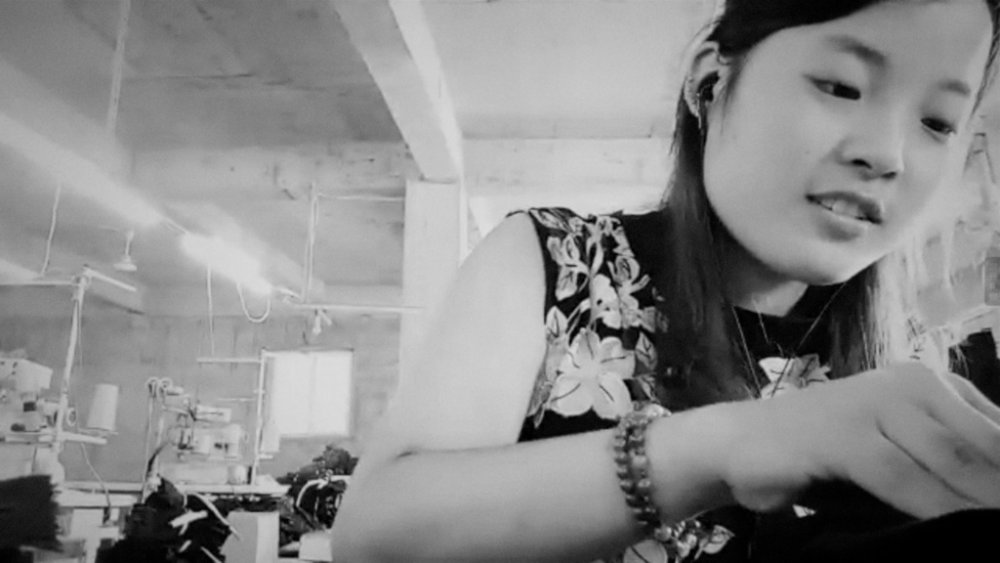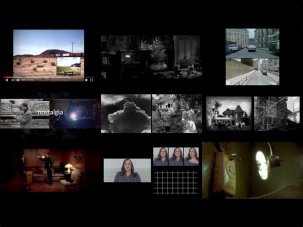“Nowadays, the boundary between reality and virtuality is becoming more and more ambiguous.”
— Cyberspace Administration of P.R. China
“We create a social sculpture, and then, as we do with most conceptual and participatory artworks, we abandon it, leaving it to be trashed by anonymous cleaners.”
— Geert Lovink, What Is the Social in Social Media?
Present.Perfect. is at the fourth Frames of Representation festival at the ICA on 20 April 2019.
Expression of an Egg screens at the Red Umbrella Struggles exhibition, running 18-23 April 2019 at the Edith-Russ-Haus for Media Art.
Much film discourse in recent years has revolved around the effect that streaming is having on cinema. Understandably, this is about how online platforms are disrupting traditional distribution models, how they are catalysts in evolving viewing habits. Zhu Shengze’s new documentary Present.Perfect., which closes the 2019 edition of Frames of Representation at the ICA, is interested less in films that are streamed online once they’re made than films that are made from online streams. It is one of several documentaries in recent memory, along with an emerging genre of fiction filmmaking, that seeks to interrogate how contemporary film is engaging with the way that streaming, social media and the ubiquity of electronic devices is evolving habits in wider society.
“Obviously, we live on screens,” Russian-Kazakh filmmaker Timur Bekmambetov told Screen in 2018. “The most important and dramatic events are happening on screen.” He was discussing his ongoing Screenlife project which to date has included films such as Unfriended (2014), Profile (2018) and Searching (2018), narrative dramas all told via footage captured on screens.
Bekmambetov has observed that seeing someone’s laptop screen is a uniquely modern glimpse into their personality. In Unfriended, we see what characters truly wanted to say in online conversations before they delete an instant message and start again – a level of psychological insight arguably difficult to glean in a traditionally filmed exchange. In Profile, the protagonist, who is pretending to be someone she is not, is asked to mirror her desktop and has to quickly create a new one that won’t give her ruse away. Searching is a little more formally loose, director Aneesh Chaganty allowing the action to jump from device to device to serve his story, but its exploration of public and private lives and images is somewhat more of a piece with the most interesting nonfiction work in the area.

Cam (2018)
Similarly, Isa Mazzei and Daniel Goldhaber’s gripping thriller Cam (2018) applies a supernatural bent to the amorphous nature of online identity. These films use our experience of online interactions – on social media, in chatrooms – to explore the interiority of their subjects, non-fiction films in this area tend to be wrestling with something even more complicated.
Present.Perfect. opens with an explanation that 2016 is considered the genesis of China’s live-streaming craze and that by 2017 the country’s various streaming sites had over 400 million users. In an article for Vulture called Art at Arm’s Length: A History of the Selfie, Jerry Saltz argues that “[i]t’s possible that the selfie is the most prevalent popular genre ever.” For Zhu and others, this offers an unprecedented mass of found footage material through which to examine trends in self-representation, how online communities shape modern sociality, and the state of their respective nations.
National Narrative trailer
Grégoire Beil’s National Narrative (2018), Dominic Gagnon’s Going South (2018), Dean Fleischer-Camp’s Fraud (2016) and Xu Bing’s Dragonfly Eyes (2017) – part of the 2018 Frames of Representation programme – all craft uploaded content into meditations on oversharing and the authenticity of the image. Daniel Jacoby’s new short Expression of an Egg (2019), which is about to debut in the Red Umbrella Struggles exhibition at the Edith-Russ-Haus for Media Art, navigates the world of camboys/girls to probe at ideas of avatar and identity. Chris Kennedy’s Watching the Detectives (2017) – due to screen as part of the BFI’s Raised by the Internet season on 26 April – explores group behaviour in online forums.
National Narrative, Going South and Present.Perfect. make for a fascinating triptych about (self-)representation. Struck by a proliferation of publicly shared material, Zhu focused in on the live-streaming channels of specific individuals referred to as ‘anchors’ and her work moves back and forth between them, observing without comment. Her main intervention is to convert the footage into monochrome, adding a level of distance from the subjects and reminding the audience of the subjective construction of the work.
Through the film, Zhu seeks to understand what it is that drives people to offer themselves to the public. The natural cultural tendency here is to ascribe solipsism. This is perhaps the closest position to that often assumed in Going South, a film crafted from myriad YouTube uploads. Dominic Gagnon has been working in this way for years, most famously in the shape of the controversial precursor to Going South, Of the North, which campaigners protesting its portrayal of Inuit people described as “a broken mirror that reflects a distorted and doctored image”.
Going South trailer
Gagnon seems to take up this position himself in Going South, constructing a frenzied picture of a post-fact era including a disapproving portrayal of narcissistic selfies and vlogs. In Bernie Hogan and Barry Wellman’s essay The Relational Self-Portrait, however, they argue that online self-representations “do not simply exist to create a static immortalised self, but a dynamic and selective digital self that can link to and communicate with others”. There is no denial of the curatorial aspect of persona here, but any assumption of conceited motivations is questioned. That same notion is undercut by the humanity of Zhu’s film and the very similar National Narrative; neither is pushing audiences to condemn.
In fact, both Present.Perfect. and National Narrative are careful to let us see self-deprecation and awareness. Like Zhu’s film, Beil’s is a compendium of streaming clips – primarily by French user of the video chat Periscope – and in each film audiences may balk at the exhibitionist inclinations behind, and the banality of, such oversharing. However, attitudes towards notions of privacy and intimacy are changing. In her book It’s Complicated: The Social Lives of Networked Teens, Danah Boyd suggests that “[r]ather than asking themselves if the information to be shared is significant enough to be broadly publicized, [people] question whether it is intimate enough to require special protection… many participants embrace a widespread public-by-default, private-through-effort mentality.”

Present.Perfect. (2019)
This is evident in the perceived intimacy of some things that individuals share information about in both films – including physical and emotional trauma – and factors into conversations around what they are allowed to show. A young woman in Present.Perfect. says her feed “will be shut down if I show you the toilet,” and mutes the audio because even “hearing it is too much”. In National Narrative, a young woman in a bra is encouraged to disrobe further by a commenter and retorts: “You keep asking me to do some stuff, and when I finally do, I get banned from Periscope!”
In his essay Selfies without the Self on The New Inquiry, Rob Horning echoes Geert Lovink (in the quote that opened this piece) by suggesting that selfies are less an expression of inner essence than “an artisanal product” that depends on context more than content. He goes on to say that the “selfie is sometimes condemned for its inauthenticity, but in its explicit constructedness, the selfie may herald the emergence of a post-authentic self: an overtly manufactured self that is confirmed and rendered coherent in an audience’s reactions and always changing with each image, as opposed to a static ‘real self’”.
This is perhaps most acutely explored in the narrative feature Cam, which follows camgirl Lola (Madeline Brewer) attempting to get her channel to the top of the rankings. She soon finds herself the victim of unsettling online identity theft, but her desire to entice people onto her channel, and for them to shower her with virtual – and real – gifts, shapes who she is. Daniel Jacoby’s Expression of an Egg is born of the same world, but in his work of creative nonfiction, a camboy juxtaposes his ‘real-self’ and avatar to highlight the malleability of identity via oblique references to Hiroshi Teshigahara’s psychological drama The Face of Another (1966), in which a man’s personality changes after reconstructive surgery.
Watching the Detectives (2017)
In more conventionally documentary work, there is an imperative to remember that anchors are not performing to an unblinking eye. Filmmakers may be reconstituting these videos into feature-length films with narrative and thematic rhythms, but in the likes of Present.Perfect. and National Narrative the interactions with watchers are of primary importance to the experience. “Social media fulfil the promise of communication as an exchange,” says Lovink. “Instead of forbidding responses, they demand replies.” Whether this is heart-shaped likes on Periscope or tiger coins in Present.Perfect., such validation is precisely what is being sought.
In Facebook: A Court of Ignorant, Cruel Judges, Jon Rich reiterates this idea that “users find themselves in the position of a superstar or a prophet, needing to utter profound statements and expecting the cheers of the crowd”. However, he goes on to assert that on many social media, as it “becomes easier and easier for people to connect, this loop tragically kills conversations and exchanges them for proclamations of ignorant judges who know nothing of the world but their own personal narratives and verdicts”. For the most part on these streaming and video services, users are communicating with a homogenous mass.
Watching the Detectives engages with group dynamics by presenting the conversations and observations made by message board contributors on Reddit, 4Chan etc. as they attempt to investigate the Boston Marathon Bombing in 2013 through photo analysis. The film is an expertly crafted look at the slow build of hysteria and the recklessness of crowd-sourced super-sleuthing in apportioning blame via confirmation bias. National Narrative also touches on social media responses to crises, as users react to the 2016 terrorist attack in Nice. There is cognitive dissonance to people filming fireworks while imparting news of the attack to their viewers, and one video of people dancing at Bastille Day celebrations continues as comments pop up on screen: “They don’t know yet about the attack.”
Present.Perfect. trailer
The online crowd has the power to be kind or cruel with the tap (or not) of a button. Various users in National Narrative are targeted by trolls, with issues of race and sexuality coming up on several occasions. One young man in Present.Perfect. proposes holding a yoga pose for 30 minutes but quickly gives up, lamenting: “What the hell? I’m doing my best. Why don’t you chat with me?” Elsewhere others are ridiculed; one anchor who appears regularly performing dances to cheesy music lambasts their audience for the abuse they’re receiving. You can imagine the snowball effect seen in Watching the Detectives and explored in Jon Ronson’s book So You’ve Been Publicly Shamed.
All that said, what Zhu really discovered was the positive effect that these connections had for many people. Speaking to Film Comment she described having “found a smaller number of people who use live-streaming to connect with others while they’re isolated in real, offline, life”. What Zhu saw watching those videos was what Andrew Keen (in Digital Vertigo) calls the “anti-social future, the loneliness of the isolated man in the connected crowd”. One of the anchors with a disability echoes this, asking his audience, “Do we still have something called friends?” before answering himself: “Yes, but rare.”
However, where Keen’s writing warns against the over-use of social channels, Zhu’s film is not sorrowful of a lost past as much as fascinated by how users are combating loneliness. Anchors with disabilities, in particular, claim to have gained new confidence by their streaming interactions. One user speaks openly about having not left the house for years until his audience encouraged him to. He has been able to re-shape himself via this new medium, and if these films exploring our networked lives have one common message it is that online platforms are constantly evolving notions of discrete personal identity and modes of socialisation. We’re no longer a static headshot so much as a live-stream.
“The relation between what we see and what we know is never settled.”
— John Berger, Ways of Seeing
—
Correction (23 January 2020): This article originally applied male pronouns to Zhu Shengze, who is female. We have amended them.
-
The Digital Edition and Archive quick link
Log in here to your digital edition and archive subscription, take a look at the packages on offer and buy a subscription.









